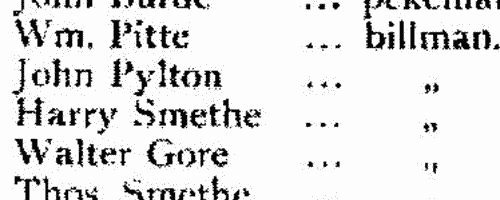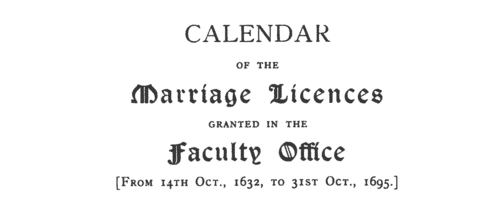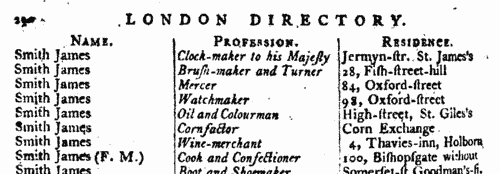Fyffe Surname Ancestry ResultsOur indexes 1000-1999 include entries for the spelling 'fyffe'. In the period you have requested, we have the following 115 records (displaying 1 to 10): Single Surname Subscription | | | Buying all 115 results of this search individually would cost £604.00. But you can have free access to all 115 records for a year, to view, to save and print, for £100. Save £504.00. More... |
These sample scans are from the original record. You will get scans of the full pages or articles where the surname you searched for has been found. Your web browser may prevent the sample windows from opening; in this case please change your browser settings to allow pop-up windows from this site. Close Rolls
(1447-1454)
The close rolls of the 26th to 32nd years of the reign of king Henry VI record the main artery of government administration in England, the orders sent out day by day to individual officers, especially sheriffs of shires: they are an exceptionally rich source for so early a period. There is also some material relating to Wales, Scotland, Ireland and the English possessions in France. FYFFE. Cost: £4.00.  | Sample scan, click to enlarge

| Militia in Glaston Twelve Hides hundred, Somerset
(1569)
A muster of the ablemen, gunners, light horsemen, pikemen, archers and billmen available from this hundred, compiled by sir Hugh Paulet, sir Maurice Barkeley, sir Ralph Hopton and John Horner in answer to a royal commission of the 11th year of queen Elizabeth. The returns are arranged by tithing. The hundred consisted of the parishes of Baltonsborough, (the borough of) Glastonbury, Meare, North Wootton, Nyland, West Bradley and West Pennard. (The sample shown is from the return for the borough of Axbridge)FYFFE. Cost: £6.00.  | Sample scan, click to enlarge

| Licences for marriages in southern England
(1632-1714)
The province or archbishopric of Canterbury covered all England and Wales except for the northern counties in the four dioceses of the archbishopric of York (York, Durham, Chester and Carlisle). Marriage licences were generally issued by the local dioceses, but above them was the jurisdiction of the archbishop. Where the prospective bride and groom were from different dioceses it would be expected that they obtain a licence from the archbishop; in practice, the archbishop residing at Lambeth, and the actual offices of the province being in London, which was itself split into myriad ecclesiastical jurisdictions, and spilled into adjoining dioceses, this facility was particularly resorted to by couples from London and the home counties, although there are quite a few entries referring to parties from further afield. Three calendars of licences issued by the Faculty Office of the archbishop were edited by George A Cokayne (Clarenceux King of Arms) and Edward Alexander Fry and printed as part of the Index Library by the British Record Society Ltd in 1905. The first calendar is from 14 October 1632 to 31 October 1695 (pp. 1 to 132); the second calendar (awkwardly called Calendar No. 1) runs from November 1695 to December 1706 (132-225); the third (Calendar No. 2) from January 1707 to December 1721, but was transcribed only to the death of queen Anne, 1 August 1714. The calendars give only the dates and the full names of both parties. Where the corresponding marriage allegations had been printed in abstract by colonel Joseph Lemuel Chester in volume xxiv of the Harleian Society (1886), an asterisk is put by the entry in this publication. The licences indicated an intention to marry, but not all licences resulted in a wedding. FYFFE. Cost: £4.00.  | Sample scan, click to enlarge

|  Masters of Apprentices registered at Edinburgh
(1715-1717) Masters of Apprentices registered at Edinburgh
(1715-1717)
Apprenticeship indentures and clerks' articles were subject to a 6d or 12d per pound stamp duty: the registers of the payments usually give the master's trade, address, and occupation, and the apprentice's father's name and address, as well as details of the date and length of the apprenticeship. There are central registers for collections of the stamp duty in London, as well as returns from collectors in the provinces. There was a single collection for the whole of Scotland, made in Edinburgh. The sums collected are recorded in Scottish money, with conversion to sterling for transfer to London. A Scottish pund was worth 20 English pence. Because of the delay before some collectors made their returns, this register includes indentures and articles from as early as 1714. (The sample entry shown on this scan is taken from a Norfolk return)FYFFE. Cost: £8.00.  | Sample scan, click to enlarge

|  Masters of Apprentices registered in Scotland
(1728-1731) Masters of Apprentices registered in Scotland
(1728-1731)
Apprenticeship indentures and clerks' articles were subject to a 6d or 12d per pound stamp duty: the registers of the payments usually give the master's trade, address, and occupation, and the apprentice's father's name and address, as well as details of the date and length of the apprenticeship. There are central registers for collections of the stamp duty in London, as well as returns from collectors in the provinces and in Scotland. The sums collected are recorded in Scottish money, with conversion to sterling for transfer to London. A Scottish pund was worth 20 English pence. (The sample entry shown on this scan is taken from a Norfolk return)FYFFE. Cost: £8.00.  | Sample scan, click to enlarge

|  Masters of Apprentices registered in Scotland
(1741-1745) Masters of Apprentices registered in Scotland
(1741-1745)
Apprenticeship indentures and clerks' articles were subject to a 6d or 12d per pound stamp duty: the registers of the payments usually give the master's trade, address, and occupation, and the apprentice's father's name and address, as well as details of the date and length of the apprenticeship. There are central registers for collections of the stamp duty in London, as well as returns from collectors in the provinces and in Scotland. The sums collected are recorded in Scottish money, with conversion to sterling for transfer to London. A Scottish pund was worth 20 English pence. (The sample entry shown on this scan is taken from a Norfolk return)FYFFE. Cost: £8.00.  | Sample scan, click to enlarge

|  Apprentices registered in Scotland
(1769) Apprentices registered in Scotland
(1769)
Apprenticeship indentures and clerks' articles were subject to a 6d or 12d per pound stamp duty: the registers of the payments usually give the master's trade, address, and occupation, and the apprentice's name, as well as details of the date and length of the apprenticeship. There are central registers for collections of the stamp duty in London, as well as returns from collectors in the provinces. These collectors generally received duty just from their own county, but sometimes from further afield. The indentures themselves can date from a year or two earlier than this return. (The sample entry shown on this scan is taken from a Durham return. Each entry has two scans, the other being the facing page with the details of the indenture, length of service, and payment of duty.) IR 1/57FYFFE. Cost: £8.00.  | Sample scan, click to enlarge

| Masters of Merchantmen
(1785)
The Daily Universal Register of January 1785 includes a section entitled Ship News. This is compiled from reports from Portsmouth, Deal, Poole and Gravesend as to merchant shipping movements; news of losses and sightings coming in from various ports; a list of Ships Arrived in the (London) River, in the Clyde, in the Downs, in the Humber, in Bantry Bay, off Beachy Head, off Beer Haven, off Cape Clear, off Cape Fear, off Hastings, off Hilston, off Portland, off Porto Bar, off Scilly, at Alicante, Ancona, Antigua, Baltimore, Barbadoes, Belfast, Bilbao, Bonny, Bordeaux, Boulogne, Bremen, Brighthelmstone (Brighton), Bristol, Cadiz, Cape Breton, Cartagena, Charlestown, Chester, Constantinople, Cork, Corunna, Cowes, Creek, Crookhaven, Dantzig, Dartmouth, Dominica, Dover, Dublin, Exeter, Falmouth, Faro, Figuera, Genoa, Gibraltar, Gottenburg, Greenock, Grenada, Halifax (Nova Scotia), Havannah, Hoylake, Hull, Jersey, Killybegs, Lancaster, Leghorn, Leith, Limerick, Lisbon, Liverpool, Londonderry, L'Orient, Lowestoft, Madeira, Madras, Milford, Minorca, Mogador, Naples, New Calabar, New Providence (Bahamas), New York, Newry, Nice, Old Calabar, Oporto, Ostend, Peel, Penzance, Philadelphia, Piscatequa, Plymouth, Pondicherry, Port Roseway, Porto, Portsmouth, Rochelle, Ross, Rotterdam, St Kitts, St Lucia, St Michael, St Vincents, Savannah, Scarborough, Southampton, Tenerife, Texel, Tobago, Torbay, Vigo, Waterford, Whitehaven, and in 'Africa', Angola, Grenadoes, Honduras, the Isle of Wight, Jamaica, Maryland, New England, Newfoundland, Philadelphia and Virginia; and Reports of Ships made at the Custom House in London. Except in the home ports, the register refers only to British shipping: each ship is usually identified merely by its name, and the master's surname, although masters' christian names are given occasionally. Naval vessels are mentioned rarely, and their captains' names not usually stated. FYFFE. Cost: £6.00.  | Sample scan, click to enlarge

|  Masters of clerks and apprentices
(1787) Masters of clerks and apprentices
(1787)
Apprenticeship indentures and clerks' articles were subject to a 6d or 12d per pound stamp duty: the registers of the payments usually give the master's trade, address, and occupation, and the apprentice's name, as well as details of the date and length of the apprenticeship. 2 January to 31 December 1787. IR 1/33FYFFE. Cost: £8.00.  | Sample scan, click to enlarge

| Traders and Merchants in London
(1791)
The Universal British Directory was published in five volumes, starting in 1791. The professions included in the London section are very diverse: the addresses are mostly from central London. Some are marked 'F. M.', meaning Freeholder of Middlesex.FYFFE. Cost: £6.00.  | Sample scan, click to enlarge

|
Research your ancestry, family history, genealogy and one-name study by direct access to original records and archives indexed by surname.
|













